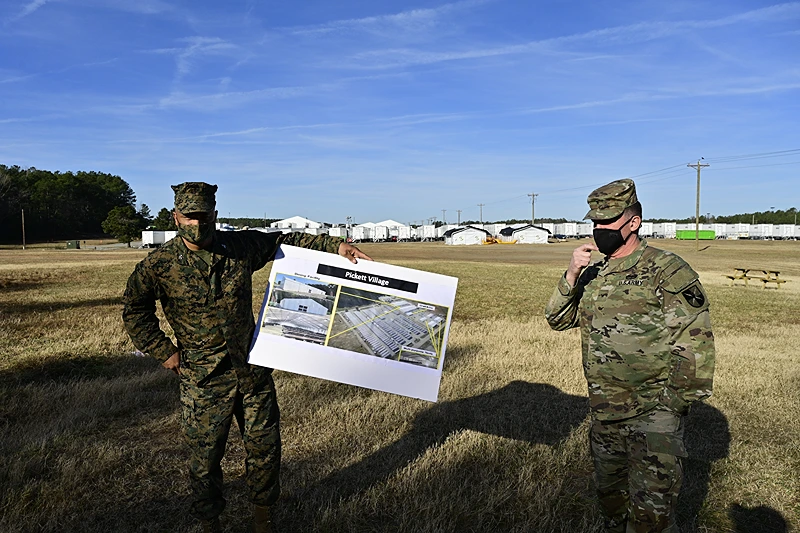
OAN’s Brooke Mallory
2:20 PM – Sunday, May 28, 2023
Retired Lieutenant General Tom Bostick, a member of the Naming Commission tasked with renaming Army bases named in honor of Confederate generals, commented on the move, saying, “I wonder what took so long.”
“What was galling is that we would still in this day and age have names of bases that represented traitors, who fought against their country and for the purpose of slavery.”
Bases like Fort Pickett, which bears the name of General George Pickett, who famously led the Confederates’ final charge in the Battle of Gettysburg, will soon be “rebranded.”
In Blackstone, Virginia, which is the nearest town close to Fort Pickett, The former mayor, Billie Coleburn, now works as an editor for the area’s local newspaper and also commented on the move.
“Here in rural southern Virginia, change comes very slowly, and we don’t always embrace change. There are many people I talk to – many, many of them are dear friends of mine – that are strongly opposed to it being renamed… “I’d say the majority of folks around here would tell you in a heartbeat, keep it Pickett,” Coleburn said.
On July 3rd, 1942, the anniversary of Pickett’s charge, Fort Pickett was officially opened. At 3:15 p.m., the precise time of Pickett’s charge, it was then officially dedicated.
The governor of Virginia made remarks at the dedication ceremony, saying that Pickett “stands with (Robert E.) Lee and (Stonewall) Jackson among the immortals.”
Now retired from West Point, Brigadier General Ty Seidule had taught history and led field trips for his pupils. He described what transpired during Pickett’s charge at Gettysburg.
“Twelve thousand, five hundred Confederate soldiers from three divisions attack to this position … and it is an absolute and utter catastrophe. They came into this kill zone, and just were slaughtered.”
Pickett had lived through it, and in 1864 he mercilessly killed 23 U.S. Army soldiers.
“After the war, he skedaddles to Canada because he thinks he’s going to be hanged as a war criminal,” Seidule said.
Robert E. Lee, who had left the U.S. Army to lead the Confederate forces, was the one who gave the order for Pickett to charge. A huge statue still honors him at Gettysburg.
“The idea was that Lee was a hero. How ironic that a person trying to destroy the United States of America becomes the great American,” Seidule asserted.
“Makes you wonder who won the battle?” asked Martin.
“Yes. The United States Army won the battle, no doubt about it, but who won the memory of that battle?”
The word “Pickett” is everywhere you look at the fort’s fire station. The chief of the station, Danny Clary, had a few words to share as well regarding the name change. When asked how he felt about it, Clary responded, “Sad. I understand why they’re doing it, but it’s been here a long time, and it’s going to take a lot of people a while to adjust.”
It will now be called “Fort Barfoot,” taking its name from Col. Van Barfoot, who was awarded the Medal of Honor for his valor during World War II. It is the first Army base in the country to bear a Native American name.
The local sheet metal shop, operated by a man named Kyle Gee, explained how he has been extremely active in producing signage for the newly-branded Fort Barfoot.
Nine Army bases all together, including the old Fort Pickett that is now formerly known as Fort Barfoot, will no longer have names honoring Confederates.
“Commemoration is about our values. It’s how you inspire people,” Seidule maintained.
Fort Bragg will change its name to Fort Liberty this week, and another base named after Lt. Gen. Leonidas Polk, Fort Polk in Louisiana, is also planning on making the move to change its name as well.
Fort Benning, which was the former name of another base paying reverence to Brig. Gen. Henry Benning, who was a known member of the Ku Klux Klan, changed its name to Fort Moore, referencing the notable military couple Hal and Julia Moore. Julia permanently altered the once-impersonal system that delivered “regret to inform you” telegrams to the families of the slain, and Hal was the commander of American troops in the first head-to-head battle against the North Vietnamese.
Bases are not the only things changing names, either. All Confederate monuments and memorabilia that is scattered around American military sites is reportedly going through major renovation, if not now, then most likely soon in the future.
Bostick expressed amazement at the extent to which Confederate artifacts were ingrained in Army culture.
“There were hundreds of things that needed to change. There’s a Lee Gate and Lee Housing Area and Lee Barracks at West Point.”
However, many critics of the rebrand claim that new progressive military leaders are attempting to erase history while appeasing liberals and lefties with the name changes.
“We’re not going to end racism in one fell swoop, but this isn’t a bad place to start,” Seidule said.
Stay informed! Receive breaking news blasts directly to your inbox for free. Subscribe here. https://www.oann.com/alerts

